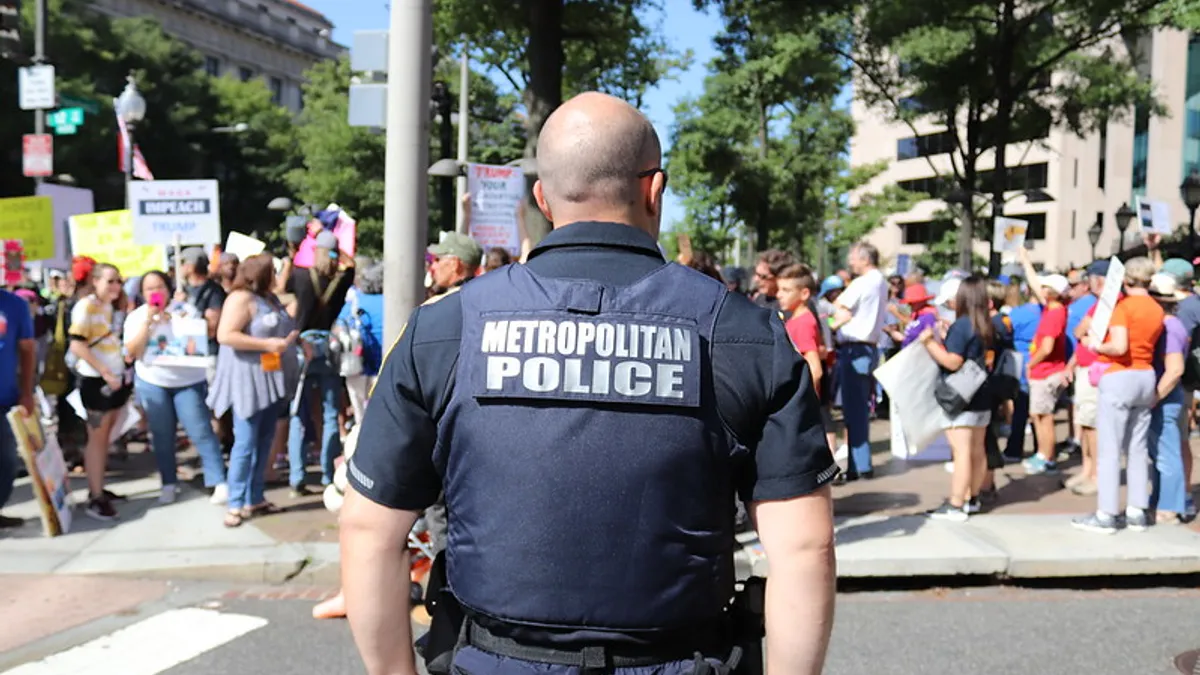Dive Brief:
- A report published last week by Washington, DC-based think tank The New Center calls for bipartisan policing reform that would develop a nationwide database of officer conduct to improve police accountability and transparency.
- The proposed database would require departments to report information including officers' physical use of force, misconduct complaints and information on no-knock warrants to remain eligible for federal grants.
- The call for increased data collection comes as governments nationwide consider policing reforms in the wake of the police killing of George Floyd in Minneapolis. "Before you can make good policy, you need to be able to find good data," said Ryan Clancy, senior adviser with The New Center.
Dive Insight:
Floyd's death in late May led to nationwide protests against systemic racism, particularly directed toward police departments and the governments funding the institutions. These calls motivated action in Congress, where both House Democrats and Senate Republicans have supported separate police reform bills with the objective of data transparency as a "common denominator" — yet leaders have failed to align on policy agreements due to other conflicts of opinion, said Julia Baumel, report author and policy analyst for The New Center.
"It’s kind of unfortunate that disagreements elsewhere in the bills prevented them from moving forward on this issue at all, especially when more transparency here could allow both parties to take a more objective view of these other issues and even come to an agreement," she said.
Due to this lack of agreement across party lines — something that has plagued police reform efforts for decades — there are no national standards on accountability or transparency in policing. This complicates any efforts to effectively analyze and change existing policies, or to pass sweeping reform bills that would impact departments nationally.
"There’s just a little bit of a cart before the horse element with some of this debate we’re having," Clancy said. "We just need better information."
Baumel said there is plenty of existing tech, including body cameras, that would help departments adhere to data submission requirements. However, such data collection would take more resources, money and time that departments may not have right now, especially as cities and states look to "defund" police efforts.
She also said there is opposition to mandatory transparency measures due to privacy concerns.
"Police unions have come out against a lot of these transparency measures, arguing that if all of this information is out here about what's going on and information about officers ... it could cause them to be targets of harassment or worse from the public," she said. "They’ve argued that this kind of thing needs to be kept private — and in many places, by law, it is private."
The researchers sent their report to Congressional leaders, but have not received direct feedback. Clancy said the biggest hurdle in advancing the efforts detailed in this report will be in House and Senate leaders finding common ground in the aligned fight for data collection.
"There’s some issues where you get two people on different sides, and they don't even agree on the fundamental goal …. But in this case, you do have both parties in both chambers agreeing, we need better data reporting nationwide to make better decision making. And we even agree on the categories we need better reporting on," Clancy said. "Getting to that last point of actually figuring out the compromise, that's what they should be able to do. The fact that they can’t is very frustrating.”













